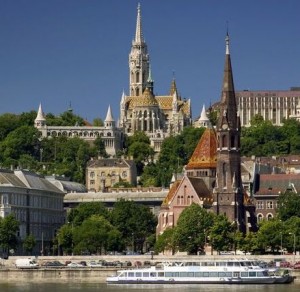 Hungary (in Hungarian: Magyarország) is a country in Central Europe. Hungary have an Austria border in the northwest, Slovakia to the north, Ukraine to the north-east of Romania southeast , Serbia to the south, Croatia to the south-west and west Slovenia.
Hungary (in Hungarian: Magyarország) is a country in Central Europe. Hungary have an Austria border in the northwest, Slovakia to the north, Ukraine to the north-east of Romania southeast , Serbia to the south, Croatia to the south-west and west Slovenia.
The capital of Hungary is Budapest and the currency is the forint.
The country is not very large (10 million inhabitants, 2 million in Budapest), but it offers many wonderful travel opportunities: the northern mountains, the great plains to the east, lakes and rivers of all kinds, and many pretty villages and hidden gems in the city. In addition, Hungary is easily accessible as it is located in the middle of Europe, a culture and a changing economy, and you get a destination not to be missed if you are in the area.
The official language is Hungarian (magyar Nyelv). Youth and citizens speak English correctly on average. But among the older people, German is spoken, however, only 23% speak English and 25% German.
Hungary lies at the crossroads of four climatic influences. On the one hand the influence of the continental Eastern Europe produces distinct seasons with temperatures strongly negative in winter and higher in summer, but tempered by air masses from the Atlantic seaboard. On the other hand, it is in the Carpathian Basin that meet sibériques influences from the north and the Mediterranean influence in the Balkans.
In general Hungarian cuisine is rich in cream and paprika! A traditional meal consists of a soup, a main dish with a salad and a dessert.
The pancakes are Palacsinta Hungary: a very fine paste stuffed, sweet or salty. The most famous dishes are Goulash , an excellent soup – Paprikas (meat stewed with paprika sauce, paprika spice is a typical Hungarian) and Derelye or “barátfüle” (a kind of ravioli Turo) to eat with cream of course!
ANd for the dessert, Aranygaluska (formed small brioche dough powder coated nuts or poppy seeds to eat with cream ).
There are panziós (pensions), generally good value for money, and hotels of all categories. Hungary is very touristy, reservations are recommended, especially in Budapest. One detail: double rooms are often equipped with twin beds, the beds are rare marriage. We may as well sleep homestay or in campgrounds. Several rental hungary owners are available. Select and contact the owner for the booking.
Hungarians are a very open people. Thus, communication is not complicated … At least in the capital! Indeed, in the Hungarian capital’s inhabitants also speak English and possibly German. The last fortnight of the year, the people is also open to the French language, but the grammar and pronunciation with no common point, the Hungarians struggling to learn and / or speak).
Once you leave the capital or major cities, such as Miskolc, Debrecen, etc … you may be surprised. In the countryside, the inhabitants speak a dialect rather often incomprehensible, and their openness to languages is slightly lower. But that is not why they are less welcoming!
It goes without saying that the best way to understand is to learn the language, Hungarians often appreciate the efforts of foreigners to learn their language.
